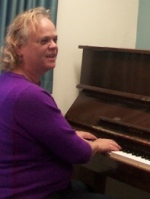
Mix Margaret Dylan Jones
W.A. composer, pianist,
teacher, article writer, lyricist
for a wide range of musical styles
Singing for Choristers
The choral voice is very different to the soloistic voice.
There are important differences between solo and choral voice production and if these differences are ignored a singer can literally lose their voice. Ask me how I know that--or read below and I'll tell you.
Singers with a soloistic voice who sing as choristers (that is, sing in a choir as opposed to singing with a choir) create a particularly complex situation that needs experienced management.
Let's start with the characteristics of the singing voice in a choir. Even though they are not usually as loud as a solo singer, a choral singer must have very precise pronunciation and diction, and must match these with the other choristers. The multiple voices within each section (soprano, alto, tenor or bass etc) must blend and this won't happen without uniform vowel sounds. Good choirmasters pay a lot of attention to how the area of the mouth opening (the lips) is used, and they insist on exact co-ordination of consonants, especially final consonants. Otherwise it's a mess.
The defining characteristic of a solo voice, on the other hand, is the much greater development of the singer's formant. This intense high-frequency component of the sound is what makes a solo voice heard over a choir or an orchestra. It makes the sound 'carry.'
Soloists constantly alter their vowel pronunciation to enable better resonance or to assist with gear changes. Getting them to blend even in duets or small ensembles is a tricky task and depends a lot on voice selection. (Careful voice selection is also crucial to choirs, but they're selecting for different characteristics.)
These fundamental differences create a problematic situation if a choir has one or more soloistic voices in its ranks. Choristers need to blend, but soloists are practically hard-wired to stand out and they will. If that is the only consequence, consider yourself lucky.
I remember times when undergraduate singing students were forbidden to sing in choirs because it was seriously affecting their voices, causing them to lose resonance and become hoarse. Indeed, this happened to me when I continued singing in choirs after beginning to learn solo singing outside of my university studies, resulting in six weeks' of speech therapy with a speech pathologist. (Although there were also several underlying factors which contributed to me losing my voice. See Learning About The Voice.)
So, if you are singing in a choir and want singing lessons you need to see a teacher who understands this particular circumstance.
For many years I taught choir singers, who were in my two choirs, in one-to-one or shared lessons. I have some special techniques for choral singing which I don't usually teach to my solo singing students, unless they are also in a choir.
Since May 2011 I've been living in the Perth hills, in the Shire of Mundaring, Western Australia.
If you would like an initial lesson with me, contact me by phone or email.
Mobile phone: 0414 374 701.
(Outside Australia: +61 414374701).
Email: see my contact page.
Why is reading or hearing about it not the same as having a lesson?

Online Vocal Resources
Professional Services
All about Margaret
My sites
PIANO PAGES HOME
SINGING SITE HOME
RESOURCE REVIEWS HOME
Combined Entry Portal
Site List